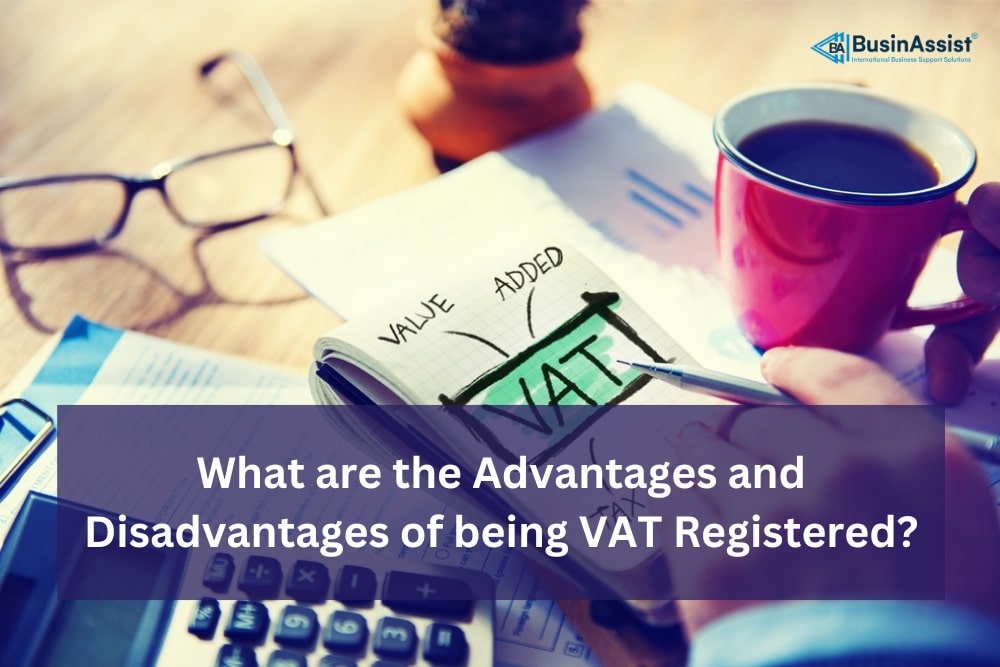Last Updated on December 24, 2025 by Joy Kyalo

UK company formation for just £0.99 and get your UK virtual office address for only £0.88 – available for both UK and non-UK residents!
Striking a balance on whether being VAT registered is beneficial for your business depends on various factors which involve considerations that can impact the financial health of your company. Let’s explore why you have to be a VAT registered business with consideration to its pros and cons.
What is VAT ?
Value Added Tax is a consumption tax placed on a product or service whenever value is added at each level of the supply chain. VAT also applies to certain goods and services imported into the UK from the EU and non-EU countries.
When is it compulsory to register for VAT?
When your business’ VAT taxable turnover for the last 12 months is more than £90,000 (the VAT threshold), you must register for VAT. However, you can also choose to register if your turnover is less than £90,000. (voluntary registration).
Additionally, if you expect your turnover to go over £90,000 in the next 30 days, you must register for VAT. You should note that your effective date for registration is the date you realised, and not the date when your turnover went above the threshold.
Regardless of VAT taxable turnover, you may register for VAT if you are based outside the UK, your business is based outside the UK and you supply any goods or services to the UK or expect to in the next 30 days.
You must register for VAT if you take-over a VAT-registered business and the combined taxable income for the new business and your existing business is over the threshold.
You’ll need to register if you only sell goods or services that are exempt from VAT but you buy goods for more than £90,000 from EU VAT-registered suppliers to use in your business.
Is there any way to avoid registering for VAT?
To avoid registering for VAT, you can convince HMRC that your increase in sales is temporary and request an exemption. If your situation justifies it, HMRC may grant you a special dispensation.
You may also avoid VAT registration by splitting your business into different parts. A business splitting arrangement is when two businesses trade independently of each other under different legal entities. However, be cautious as HMRC closely examines such cases.
You can register your business on a flat rate scheme, a better alternative to paying the 20% rate. However you are not allowed to claim back the VAT on your purchases unless they are a one-off capital investment.
You may avoid registering for VAT by selling supplies that are exempted from VAT such as, children’s clothes, medical supplies and equipment.
Can you register for VAT voluntarily?
You certainly can voluntarily register for VAT even if your turnover is below the VAT threshold. The application process of registering voluntarily can be done online at GOV.UK by completing the VAT1 form available on the HMRC website. Once registered, you will receive a VAT registration number.
After registration, you will need to charge VAT on your sales and submit VAT returns (usually quarterly) to HMRC, reporting your output and input VAT.
What is the process to follow when registering for VAT?
- To register your company for VAT, the application process can be completed online on the HMRC website.
- You will need to create a VAT online account also known as a Government Gateway account and register for VAT. This is the account you will use to submit your VAT returns online.
- After signing up, you can start the registration process as guided on the website.
- Enter all details and documents needed to apply for VAT.
- Once registered, HMRC will provide you with a VAT registration certificate.
The VAT registration certificate displays your VAT number and the date of the first VAT return and payment. It also displays the effective date of registration.
How long does it take to register for VAT and get a VAT number?
It may take 30 working days to get your VAT registration certificate, however the duration may vary if you have done registration online or by post.
Process time may also vary if there are any additional documents or information required from you and HM Revenue & Customs (HMRC) workload.
What will be the advantages to your business once you are registered for VAT and have a VAT registration number?
- Makes your business look legitimate: Partners and customers may feel confident working with a business that has registered for VAT. This creates a positive reputation for your business.
- Ability to reclaim input VAT: You can reclaim VAT paid on purchases and expenses from HMRC. This reduces your overall costs.
- Simplifies cross-border transactions: VAT registration simplifies cross-border transactions for import and export business and ensures compliance with VAT rules.
- Access to VAT schemes: VAT registration can opt for various VAT schemes such as Flat Rate Scheme which simplifies VAT accounting, Annual Accounting Scheme which allows you to spread VAT payments over the year, and Cash Accounting Scheme which allows you to account for VAT based on cash received and paid.
- Enhance competitiveness within the market: Many customers and suppliers may prefer to deal with a VAT registered business since it complies with tax regulations.
- Recover input VAT on capital assets: VAT registered businesses can recover input VAT on capital assets such as equipment reducing capital investments burden.
What will be the disadvantages to your business once you are registered for VAT and have a VAT registration number?
- Liable for VAT payments: As a VAT registered business, you are liable for VAT payments to HMRC. You must pay your VAT bill by the deadline and this can result in penalties if you fail. Deadline may differ depending on if you use the Annual Accounting Scheme or make payments on account.
- Cash Flow challenges: VAT registered businesses need to pay output VAT which can affect their cash flow especially if they have long payment cycles.
- Costly and time consuming: Maintaining detailed records for VAT purposes can be time consuming and costly.
- Pricing challenges: VAT can influence the pricing of your goods and services. You may either decide to pass VAT costs to your customers or absorb them.
- Complex transaction: Import and export businesses may find it challenging dealing with cross-border transactions. VAT treatment varies when trading with other EU countries or post-Brexit UK.
Is there a way to reduce your VAT liability?
To reduce your VAT liability, you will have to do financial strategic planning and understand the rules. To effectively manage your VAT, you should consider the Flat Rate Scheme (FRS) if your annual turnover is £150,000. Under this scheme, you pay a fixed percentage of your gross turnover as VAT.
Annual accounting scheme allows you to submit VAT returns annually instead of quarterly bringing flexibility in payments and reducing administrative burden.
If your annual turn-over is below £1.35 million, you can use a cash accounting scheme. With this, you account for VAT when you receive payments from customers rather than issuing invoices.
Additionally, if your turnover is below the VAT registration threshold (£90,000), you can consider voluntary registration which allows you to reclaim input VAT on business expenses.
You can consider group registration if you have multiple companies under one control. This will simplify VAT accounting.
If you make both taxable and exempt supplies, you can recover a portion of input VAT related to taxable supplies.
You can also consider zero rated supplies to reduce the overall liability. Such products are : children’s clothing, books, most foods etc.
Are there any goods and services that are exempt from VAT?
Goods and services that are exempted from VAT are supplies which do not meet the definition of taxable supplies. There are two goods and services that are exempted from VAT known as exempt supplies and specified supplies.
Exempt supplies are business supplies on which VAT is not charged whereas specified supplies are supplies which would be exempt from VAT if you made them in the UK.
Some of the goods and services include:
- Certain selling, leasing and letting of land and buildings (but not lettings of garages, parking spaces or hotel and holiday accommodation)
- Education, sporting, and training
- Insurance, finance, and credit
- Betting, gambling and lotteries (but not takings from fruit machines)
- Providing credit
- Fundraising events by charities
- Subscriptions to certain membership organisations
- The services of doctors and dentists
- Certain services from undertakers
Remember, this list is not exhaustive and there may be more goods and services that are exempted from VAT. If you are not sure whether the supplies you make are exempt from VAT, contact the VAT Helpline.
Read Also:
- Can i Change my Limited Company Name: The Ultimate Guide
- What is Postal Fraud and How can BusinAssist Help me From Being a Target?
- What is an EORI Number? – A Guide
- Everything You Need to Know About Companies House Default Address
- What is a First Gazette Notice for Compulsory Strike-Off?
- Being VAT Registered Is Killing my Business
- What Are the Disadvantages of a Dormant Company?
- What is a Certificate of Incorporation and How Can one be Obtained? 2024 Guide
- How to Find a Company’s VAT Registration Number in the UK: A Step-by-Step Guide

The BusinAssist Editorial Team has 15+ years of experience writing about small business and company formation in the UK, Canada, and the USA. We simplify complex processes and provide practical insights to help entrepreneurs succeed. Business Assist with BusinAssist – your partner for business success.
